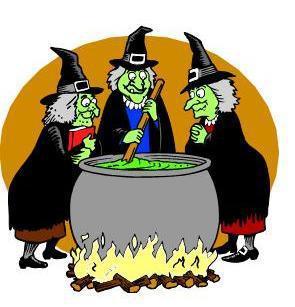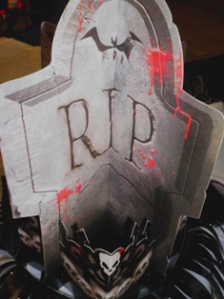Pat Bertram's Blog, page 254
October 31, 2012
The Queen of the Witches — A Halloween Fable Just for Fun
Once upon a time,
Long ago and far away,
Lived the queen of the witches,
Griselda the Gray.
If you think all witches are tall and thin,
You are wrong about that.
Griselda the Gray was short
And extremely fat.
Like everyone else,
Griselda tried to be good.
Griselda never did anything bad
Like normal witches should.
This upset the other witches
Because they had to copy their queen.
They had to be nice
When they wanted to be mean.
So they all got together
And mixed up a brew.
They gave it to Griselda
When they were all through.
The brew was so rotten
Griselda had a fit.
She screamed and yelled
And hollered and bit;
She howled and cackled
And made such a noise
That the other witches were happy
And began to rejoice.
“Griselda is bad
And we are glad.
Griselda is ghastly
So now we can be nasty.
Oh, what a happy, horrible day!
Hurrah for our queen, Griselda the Gray!”
The moral of this story is that witches should
Never try to be very good.
Tagged: fable, Griselda the Gray, halloween, moral, story, story in rhyme


October 30, 2012
Have a chilly, scary, rationally-explained Halloween!
 Please welcome JJ Dare, friend and fellow Second Wind author. JJ writes thrillers (False Positive and False World), and is one of the collaborators on the Rubicon Ranch serial. Her Rubicon Ranch characters amuse me because they are so unrepentently manipulative and unabashedly malevolent. (How can they not be with such a father as Morris Sinclair?)
Please welcome JJ Dare, friend and fellow Second Wind author. JJ writes thrillers (False Positive and False World), and is one of the collaborators on the Rubicon Ranch serial. Her Rubicon Ranch characters amuse me because they are so unrepentently manipulative and unabashedly malevolent. (How can they not be with such a father as Morris Sinclair?)
Personally, I don’t like to be scared — it’s too . . . scary — so I invited JJ to talk what scares us and why we like to be scared :
Along with countless others, I love a good scare and this time of the year is perfect for terror and thrills. Halloween is right around the corner. Ghosts, goblins and zombies reign over the land. Witches, warlocks and evil fairies lurk around sharp corners. That bump-in-the-night sound makes your heart beat faster. The skittering across the floor in a dark room gets the blood pumping. What is that shadow outside flitting across the top of the window?
Why do we love to be scared? It’s a rhetorical question because the answer for one person is probably different for another. For myself, I like the rush of the initial terror followed by a reasonable explanation for the scare. That bump-in-the-night was a cat jumping on a chair that lightly hit the wall. The skittering noise was the dog’s nails clicking on the tile floow when she trotted down the hallway. The shadow was a low-flying owl, circling the window as the two animals took turns taunting him from their inside safety.

It’s a full moon every night for Weredog
Blame the inside animals. That’s what I did the other night. While I like the scares while I’m awake, I’m not so crazy about being abruptly ripped from a deep sleep by noises at night. I don’t like lying in bed for minutes that seem like hours, waiting for that thing under my bed to slowly crawl out and grab me. I don’t dare step onto the floor else I’ll be pulled into the under-the-bed void of my childhood.
As sanity and focus slowly descend, we can laugh at ourselves for our fright. A carryover from childhood, I occasionally have a dream of the purple monster rising in my bedroom window. The fright it gave me at six years old is remarkably the same at my current older age. As it slowly rises up, the malevolence it emanated decades ago is just as strong today. In my nightmares, I know it’s no good but I’m as powerless to stop it now as I was in my single-digit years.
The stories I create in my mind from the scary things happening at night become the roux for some of my written works. While I don’t always keep the story line tight with the dream, I can trace a few of my stories and books to their chilly beginnings from the bumps-in-the-night I experience.
I like to be scared. I love scary movies, thrillers, zombies, flying monkeys, and the like. Shadowy things at night give me delicious chills. The supernatural is delightful – as long as I can explain it away, rationally, in the light of day.
Have a chilly, scary, rationally-explained Halloween!
~~~~~~~~~~~~~~~~~~~~~~~~~~~~~~~~~~~~~
J J Dare is the author of two published books, several short stories and triple digit works-in-progress.
Current enthusiasm is sharpening intangible knives and co-authoring at Rubicon Ranch
***
J J Dare is the author of two published books, several short stories and triple digit works-in-progress.
Current enthusiasm is sharpening intangible knives and co-authoring at Rubicon Ranch
Tagged: halloween, J J Dare, scary, Second Wind Publishing, warlocks, witches, zombies

October 29, 2012
Dancing Skeletons, Skulls, and Funeral Services
 I participated in a fundraiser over the weekend. (I’m not sure how much I actually participated, to tell the truth — I just signed up for a table to display my books.) The event was to raise money for hospice and bereavement classes, which are causes I believe in. I’m all for helping people get through their final days as easily as possible and especially to offer comfort and support to those left behind. It’s not just that grief slams into the bereft, making it almost impossible to breathe, but they have to deal with all the horrendous “death” chores such as planning a funeral and filling out the required official and financial paperwork involved in “removing” someone from the world.
I participated in a fundraiser over the weekend. (I’m not sure how much I actually participated, to tell the truth — I just signed up for a table to display my books.) The event was to raise money for hospice and bereavement classes, which are causes I believe in. I’m all for helping people get through their final days as easily as possible and especially to offer comfort and support to those left behind. It’s not just that grief slams into the bereft, making it almost impossible to breathe, but they have to deal with all the horrendous “death” chores such as planning a funeral and filling out the required official and financial paperwork involved in “removing” someone from the world.
A couple of the participants in the fundraiser were businesses offering funeral and mortuary services, which fit with the purpose of the event since they were trying t o make it easier for those left behind by getting people to “preplan” their funeral arrangements. (I’m restraining myself to keep from ranting about the silly jargon of the death business, such as the redundant “preplan” and the totally ridiculous “cremains.” One rant per post is enough.)
o make it easier for those left behind by getting people to “preplan” their funeral arrangements. (I’m restraining myself to keep from ranting about the silly jargon of the death business, such as the redundant “preplan” and the totally ridiculous “cremains.” One rant per post is enough.)
The only trouble with having representatives of the funeral business at the fundraiser is that this was not a serious event. It was a fun Halloween event geared toward children as well as adults. One of the mortuary booths played down their services, mostly providing pamphlets and pens for adults while offering various treats to the children, but the other funeral services participant went all out, decorating their booth with dancing skeletons, skulls, and cartoonish graves.
Perhaps the hushed and grave intonations of old-time funeral directors no longer have a place in our anything-goes society, but still, death deserves respect — for the sake of those left behind if for no other reason. Skeletons and skulls are one thing when they are used far from reality such as in Halloween festivities, but to mix such cartoonish symbols of death with the real thing just struck me as going way beyond taste and tact to downright tacky and insensitive.
They of all people should have known that for some people death is not fun, not a business, but an all too real horror.
(These photos show some of the decorations I’ve been referring to. The top photo came from the wide border of the tablecloth. The others were a couple of the tabletop decorations. Lest you think I am being too critical, I am the not the only one who found the decorations inappropriate.)
Tagged: death and grief, fundraiser, funeral services, Halloween and death, Halloween and grief, mortuary services, postaday, preplan funerals

October 28, 2012
Near Death Experiences and the Mystery of Life
 A friend sent me information about a new book, a neurosurgeon’s supposed proof that heaven is real. I admit I haven’t read the book, but I’ve read articles by the man, seen interviews of him talking about his experiences, read the reviews, and I can’t believe his experiences tell us the truth of what happens when we die. Regardless of what happened (or did not happen) with his cortex, he was not dead, so everything he says he experienced has to do with the mystery of consciousness — of life — not the mystery of death.
A friend sent me information about a new book, a neurosurgeon’s supposed proof that heaven is real. I admit I haven’t read the book, but I’ve read articles by the man, seen interviews of him talking about his experiences, read the reviews, and I can’t believe his experiences tell us the truth of what happens when we die. Regardless of what happened (or did not happen) with his cortex, he was not dead, so everything he says he experienced has to do with the mystery of consciousness — of life — not the mystery of death.
I felt such goneness after my life mate/soul mate died, such an irrevocable ending of his presence in my life and on earth, that although I believed in near death experiences during my questing youth, I can no longer believe people who had near death experiences were actually dead. Dead is dead. The neurosurgeon could have experienced something wondrous, something extraordinary and life changing, but he wasn’t dead no matter what his physicians said. It’s entirely possible (in fact, I’d say probable) the machinery that tracks our body processes and the current understanding of those processes, including that of the human biosystem, are imperfect. These NDE stories place too great a reliance on the doctors and the machines that proclaim death. Nothing on this earth — especially no machine and no doctor — is infallible.
During the past thirty-one months of my grief updates, I’ve often mentioned the feeling of utter goneness that I experienced, but I did not begin feeling my soul mate’s “goneness” until two or three hours after his death. Although I have no idea what happens to us after death, I do believe in the possibility of a continuum of life because I remember feeling him leave this earth.
At the moment of his death (when his heart stopped, that is), I did not feel anything except a moment of relief that his suffering was over. I watched the nurses clean his body and shroud it in a blanket, then I waited numbly for the funeral director. After she took away his body (in a black SUV, not a hearse), I left. The highway was dry, but about halfway home, my car suddenly went careening, around and around, back and forth, totally out of control. (I assumed I hit a patch of black ice, but that was such a peculiar night, I can’t say for sure.) I thought I was going to die, but oddly, I never left the road. The car finally came to a halt facing the wrong way on the highway. I was fine. So was the car. As I sat there gripping the wheel, I wondered if he had stopped by on his way out of this world to save me, to leave me a final reminder to be careful, or maybe give a shake of his ghostly head at this evidence of my carelessness. (He always worried that I wasn’t careful enough.) I remember feeling him leaving this earth — like a breath passing over head — but to be honest, I don’t know if I really felt his leaving at the time or if the impression was something my mind created later to explain the bewildering event. It was after this particular near death experience (as out of control as the car was, it truly is amazing that I survived intact), that the feeling of his goneness slammed into me, and I never again have had any sense of his presence in my life.
What was he doing for those hours before he left this earth? Finishing his dying, possibly. Closing down systems of the body and brain that have yet to be discovered. From grief, I have learned the power of our lizard brain, learned that there is way more to the brain — and human biology, psychology, and consciousness — than is in our textbooks. Do people experience things out of their normal lives when they are undergoing severe physical traumas such as almost dying? Many do. Some don’t.
As for the doctor who supposedly offers proof of heaven, the very length of his coma argues against his having died — if he’d been dead, his body would have begun to decay. Even if he was being kept alive by machines, he was still alive. His body was not dead. His brain is part of the body. Therefore his brain was not dead. And neither was he.
I am not denying a life continuum, a spectrum of life where this earth is the part visible to our physical senses, but a “near death experience” is a far cry from a “death experience.” Such stories offer insight into a greater glory, but it isn’t necessary the glory of heaven they offer but instead the glory of us here on earth.
***
Pat Bertram is the author of the conspiracy novels Light Bringer, More Deaths Than One, A Spark of Heavenly Fire, and Daughter Am I. Bertram is also the author of Grief: The Great Yearning, “an exquisite book, wrenching to read, and at the same time full of profound truths.” Connect with Pat on Google+
Tagged: dying, grief updates, near death experiences, proof of heaven?

October 27, 2012
Double Whammy of Grief
 For more two and a half years, Saturday was a sadder day for me. My life mate/soul mate died late Friday night or early Saturday morning, depending on how you look at it, and often my mind/body saw it both ways, with an upswing of grief on Friday that grew to a crescendo on Saturday and didn’t dissipate until dawn on Sunday. Even if I paid no attention to the calendar, grief surged, which always mystified me — how could my body know when I didn’t?
For more two and a half years, Saturday was a sadder day for me. My life mate/soul mate died late Friday night or early Saturday morning, depending on how you look at it, and often my mind/body saw it both ways, with an upswing of grief on Friday that grew to a crescendo on Saturday and didn’t dissipate until dawn on Sunday. Even if I paid no attention to the calendar, grief surged, which always mystified me — how could my body know when I didn’t?
Today is a double whammy — not only is it Saturday, but it is the 27th, the date of his death — but there doesn’t seem to be a great upsurge of sorrow on these days and dates anymore. My sadness is like an underground river running beneath my consciousness, and it doesn’t profoundly affect the hard-won peace of my days, though it does ripple and churn at times, most notably when I remember why he is out of my life. Death is too big for me to understand, and the thought of his being dead always brings tears to my eyes. Even now, after thirty-one months, I cannot bear that he is dead. Perhaps he doesn’t mind, but since he has yet to communicate with me in any way that I can comprehend, I don’t know how he is doing or even if he “is.” (Many people see butterflies or experience things that seem out of place or out of time, but I never have.)
Lately I’ve been posting articles about looking forward, about being me, about trying to open myself to surprises and the power of the universe, and sometimes I wonder if I’m just fooling myself (and you) with this pretense of being okay with my current state of affairs. I’m not okay with it, but I can’t undo death — not just his, but death in general — and so I try to act as if the universe is unfolding the way it should. And perhaps, in the final analysis, that’s all any of us can do — fake it until we make it. (Whatever “it” is.)
Maybe there is a special destiny waiting for me and that is why, even though I somehow always assumed death would pull me out of this world when it took him, that I am still here. Maybe my being here is nothing but a trick of genetics or a roll of destiny’s dice, but whatever the reason, I am still here. And he is not. It doesn’t seem fair, though I still don’t know which of us got the worst of the deal and which of us got the best. Could it be there is no worst or best? I don’t know, and probably will never know while I’m here on this earth. I can only act as if this is the best for me and go from here to wherever life might lead me.
***
Pat Bertram is the author of the conspiracy novels Light Bringer, More Deaths Than One, A Spark of Heavenly Fire, and Daughter Am I. Bertram is also the author of Grief: The Great Yearning, “an exquisite book, wrenching to read, and at the same time full of profound truths.” Connect with Pat on Google+
Tagged: butterflies and death, cannot bear his being dead, looking forward, sadder day, Saturday, why am I here

October 26, 2012
If You Don’t Have a Dream, How You Gonna Have a Dream Come True?
 Do we need to have a dream? It seems to be the consensus that yes, we do. As Harper’s Bizarre once sang, “You gotta have a dream. If you don’t have a dream, how you gonna have a dream come true?”
Do we need to have a dream? It seems to be the consensus that yes, we do. As Harper’s Bizarre once sang, “You gotta have a dream. If you don’t have a dream, how you gonna have a dream come true?”
A friend is close to achieving her dream of living by the sea and writing the livelong day. She just needs to wait a bit to make sure her sales will remain steady before she quits her day job. She attributes her dream coming true to talking about it, planning it, visualizing it. This is the way many people make their dreams come true, and it seems to work, but what if, like me, you only have vague longings rather than a concrete dream?
I would like to have a dream, to work toward something I am passionate about, but so far such passions elude me. I’d like to make a living off my books, of course. Do you notice I said “off my books” rather than “from writing”? Almost anyone can make a living by writing nowadays if they write sexy romances or mystery series and churn out two to four books a year, but I am a slow writer with few ideas. I average one book every two years, and to increase my output, I’d have to write all day every day and far into the night. Even if I could dredge up all the necessary words, I’d have to contend with the physical hardship of sitting in one place for hours on end. Besides, I don’t like romances or series of any kind. And, unlike my friend, I have no interest in spending all my time writing. There is still real-world living I have to do before I can totally immerse myself in fictional worlds.
Outside of wanting to make a living off my books, I have no real dreams. Never have had. I want, of course, but I want something greater than my imaginings. Something so wonderful or awesome that my life becomes transformed.
As a child, I loved the mystique of presents. There was the possibility of getting the gift I always wanted but didn’t know I wanted. Oddly, the most disappointing gifts were when I received what I asked for. As an adult, I don’t want to limit my dreams to what I know to ask for. I want the perfect dream — the life I always wanted but didn’t know I wanted. The problem is, if I don’t know what that dream is, if I can’t imagine it, how can I make it come true?
All I know is that I need to find a way to open myself up to the possibility of surprises. So far, I’m doing this by exploring my inner and outer worlds — searching for ways to connect more deeply to life, being present here in the now, being me. Perhaps one day, as I continue to grow and develop, I will find the surprises and unknown wonders that I have to believe are waiting for me.
***
Pat Bertram is the author of the conspiracy novels Light Bringer, More Deaths Than One, A Spark of Heavenly Fire, and Daughter Am I. Bertram is also the author of Grief: The Great Yearning, “an exquisite book, wrenching to read, and at the same time full of profound truths.” Connect with Pat on Google+
Tagged: dreams, Harper's Bizarre, life transformation, making dreams come true, presents, surprises

October 25, 2012
The Grim Origin of the Grim Reaper
 Scholars trace the origin of the Grim Reaper to ancient times where he was known as Cronus to the Greeks and Saturn to the Romans, but the Grim Reaper as he is depicted today comes directly to us from the Middle Ages and the Black Death.
Scholars trace the origin of the Grim Reaper to ancient times where he was known as Cronus to the Greeks and Saturn to the Romans, but the Grim Reaper as he is depicted today comes directly to us from the Middle Ages and the Black Death.
According to William Bramley, author of The Gods of Eden: “In Brandenburg, Germany, there appeared fifteen men with ‘fearful faces and long scythes, with which they cut the oats, so that the swish could be heard at great distance, but the oats remained standing.’ The visit of these men was followed immediately by a severe outbreak of plague in Brandenburg. Were the ‘scythes’ long instruments designed to spray poison or germ-laden gases?
“Strange men in black, demons, and other terrifying figures were observed in other European communities carrying ‘brooms’ or ‘scythes’ or ‘swords’ that were used to sweep or knock at people’s doors. The inhabitants of these houses fell ill with plague afterwards. It is from these reports that people created the popular image of death as a skeleton, a demon, a man in a black robe carrying a scythe.“
The Black Death began in Asia and spread to Europe between 1347 and 1350 where it killed over 25 million people, 1/3 of the population.
Despite the current belief that rats in overcrowded cities spread the plague, many outbreaks occurred during the summer in uncrowded conditions. And not all outbreaks were preceded by rat infestation. In fact, most outbreaks seemed to have nothing to do with an increase in rodent population. Nor were outbreaks confined to urban areas. The plague often struck isolated human populations which had no contact with infected areas.
Many people in stricken areas reported that outbreaks of the plague were caused by evil-smelling mists. Bright lights and unusual activity in the skies frequently accompanied these mists. And sometimes, a mist was seen to be coming from rocket-like airships. Not only did these mists kill people; they killed trees and destroyed the fertility of the land.
People were warned: “If newly baked bread is placed for the night at the end of a pole and in the morning is found to be milewed and internally grown green, yellow, and uneatable, and when thrown to the dogs causes them to die from eating it, then the plague is near at hand.”
Foul mists were blamed for other epidemics. During a plague in ancient Rome, Hippocrates (c.460-337 BC) had people build large public bonfires that he believed would get rid of the bad air. Considering the current belief that the plague was caused by a disease carried on the fleas of rodents, this advice seems ludicrous. But if what is intimated by these reports is true, and the plague was caused by germ-saturated aerosols such as those used in modern biological warfare, then bonfires would be the only defense.
***
Bramley’s descriptions and hypotheses of what happened in the middle ages, and the implications of what it might mean if true, really spooked me. I used this research for the following excert from Light Bringer:
“Alchemy wasn’t merely about the transmutation of metals,” Ernst said. “It was also about the transmutation of the alchemist. Once this mutation took place, the alchemist’s life span increased by hundreds, maybe even thousands of years. Apparently they learned to turn off the death genes.”
How interesting that he should mention alchemists, Teodora thought. Arist Kochavallos had recently told her that one reason for the Black Death in medieval times was that humans were becoming too advanced and had to be retarded. For him, those were not the dark ages, but an age of light. The alchemists, a greater percentage of the population than anyone imagined, were learning about nuclear fusion and fission. The Arabs were learning about rocketry and jet propulsion. Architecture, as manifested in European cathedrals, was unsurpassed. Along with many other technological inventions, a simple binary machine—a computer—had been created.
And the custodians of earth did not like what they saw.
Outbreaks of the plague were accompanied by strange phenomena, such as torpedo-shaped craft emitting noxious mists, and men dressed all in black walking through the streets with long instruments that made a swishing sound like a scythe.
According to Arist, that’s where the image of death as a skeleton in a black robe carrying a scythe originated.
More than anything else, finding out the origins of the plague had convinced Teodora that the tenth planet existed, that at least a small enclave of its inhabitants resided on Earth, and that they had no love of humans.
Tagged: grim reaper, men in black, origin of the grim reaper, rats and the plague, the black death, The Gods of Eden, William Bramley

October 24, 2012
Proverbs From Around the World — N to Z
 This is part two of Proverbs From Around the World. You can find the A to M proverbs by clicking here.
This is part two of Proverbs From Around the World. You can find the A to M proverbs by clicking here.
William Penn wrote, “The wisdom of nations lies in their proverbs, which are brief and pithy. Collect and learn them; they are notable measures of directions for human life; you have much in little; they save time in speaking; and upon occasion may be the fullest and safest answers.”
Anonymous, that prolific pontificator, wrote, “Proverbs are the cream of a nation’s thought.”
These are by no means the only proverbs from around the world, Nor are they the best. They are simply those that I happened to read and like. Feel free to add your own.
Norwegian Proverb
Heroism consists in hanging on one minute longer.
Persian Proverb
Fate: When its time has arrived, the prey comes to the hunter.
Polish Proverbs
The greatest love is a mother’s, then a dog’s, then a sweetheart’s.
When I have money, everyone called me brother.
The woman cries before the wedding, the man afterward.
Portuguese Proverb
An old man in love is like a flower in winter.
Russian Proverbs
If God listened to every shepherd’s curse, our sheep would all be dead.
The eggs do not teach the hen.
Live with the wolves, howl like a wolf.
A sleeping fox counts hens in its dreams.
When money speaks, the truth is silent.
Sicilian Proverb
The less things change, the more they stay the same.
Scottish Proverbs
Better bend than break.
A man is a lion in his own cause
Spanish Proverbs
If you want to make someone laugh, tell them your troubles.
An ounce of mother is worth a ton of priest.
There is no happiness; there are only moments of happiness.
It is better to be a mouse in a cat’s mouth than a man in a lawyer’s hands.
If I die, I forgive you. If I live, we’ll see.
Never advise anyone to go to war or to marry.
Habits are at first cobwebs then cables.
How beautiful it is to do nothing, and then to rest afterward
United States of America Proverbs
The most dangerous food is wedding cake.
Never swap horses crossing a stream
A louse in the cabbage is better than no meat at all. (Pennsylvanian Dutch.)
A people without history is like wind on the buffalo grass. (Sioux)
In the beginning God gave to every people a cup of clay, and from this cup they drank their life. (Northern Paiute)
Don’t talk unless you can improve the silence. (Vermont)
Welsh Proverbs
Heaven defend me from a busy doctor.
He understands badly who listens badly.
Better one word before than two after.
Yiddish Proverb
Small children disturb your sleep, big children your life.
Yugoslavian Proverb
Tell the truth and run.
***
Pat Bertram is the author of the conspiracy novels Light Bringer, More Deaths Than One, A Spark of Heavenly Fire, and Daughter Am I. Bertram is also the author of Grief: The Great Yearning, “an exquisite book, wrenching to read, and at the same time full of profound truths.” Connect with Pat on Google+
Tagged: American proverbs, Polish proverbs, proverbs, Russian proverbs, Spanish proverbs, Welsh proverbs, wisdom of nations

October 23, 2012
Proverbs From Around the World — A to M
 William Penn wrote, “The wisdom of nations lies in their proverbs, which are brief and pithy. Collect and learn them; they are notable measures of directions for human life; you have much in little; they save time in speaking; and upon occasion may be the fullest and safest answers.”
William Penn wrote, “The wisdom of nations lies in their proverbs, which are brief and pithy. Collect and learn them; they are notable measures of directions for human life; you have much in little; they save time in speaking; and upon occasion may be the fullest and safest answers.”
Anonymous, that prolific pontificator, wrote, “Proverbs are the cream of a nation’s thought.”
These are by no means the only proverbs from around the world, Nor are they the best. They are simply those that I happened to read and like. Feel free to add your own.
Belgian Proverb
Experience is the comb that nature gives us when we are bald.
Chinese Proverbs
Two leaps per chasm is fatal.
One joy scatters a hundred griefs.
Do not use a hatchet to remove a fly from your friend’s forehead.
Behind an able man there are always other able men.
Blessings never come in pairs; misfortunes never come alone
English Proverbs
What can be done at any time is never done at all.
As bad as marrying the devil’s daughter and living with the old folks.
Estonian Proverb
What you are afraid of overtakes you.
French Proverb
Everything passes, everything perishes, everything palls.
German Proverbs
Too clever is dumb.
An old error is always more popular than a new truth.
Indian Proverb
The cobra will bite you whether you call it Cobra or Mr. Cobra.
Irish Proverbs
It is better to be a coward for one minute than dead for the rest of your life.
Patience cures many an old complaint.
When the apple is ripe, it will fall.
Italian Proverbs
The best way to get praise is to die.
There is no thief like a bad book.
By asking for the impossible, we obtain the best possible.
Japanese Proverbs
The reverse side also has a reverse side.
To teach is to learn.
A man in love mistakes a pimple for a dimple.
The nail that sticks up gets hammered down.
A good husand is healthy and absent.
At the first cup man drinks wine; at the second cup wine drinks wine; at the third cup wine drinks man.
Jewish Proverb
If the rich could hire people to die for them, the poor could make a wonderful living
***
Pat Bertram is the author of the conspiracy novels Light Bringer, More Deaths Than One, A Spark of Heavenly Fire, and Daughter Am I. Bertram is also the author of Grief: The Great Yearning, “an exquisite book, wrenching to read, and at the same time full of profound truths.” Connect with Pat on Google+
Tagged: Chinese proverbs, Engish proberbs, Irish proverbs, Italian proverbs, Japanese proverbs, proverbs, wisdom of nations

October 22, 2012
Recycling Stories
 Please welcome JJ Dare, friend and fellow Second Wind author. JJ writes thrillers (False Positive and False World), and is one of the collaborators on the Rubicon Ranch serial. Her Rubicon Ranch characters amuse me because they are so unrepentently manipulative and unabashedly malevolent. (How can they not be with such a father as Morris Sinclair?)
Please welcome JJ Dare, friend and fellow Second Wind author. JJ writes thrillers (False Positive and False World), and is one of the collaborators on the Rubicon Ranch serial. Her Rubicon Ranch characters amuse me because they are so unrepentently manipulative and unabashedly malevolent. (How can they not be with such a father as Morris Sinclair?)
JJ is here to talk about recycling stories and finding a new purpose for them :
I’m in the midst of going through junk in my house and either trashing it, giving it away, or keeping it. I’m classifying junk as those things I have no immediate use for, things I haven’t used in years or have no idea why I kept them to begin with. I gave the cats an escape clause because they’re just too darn cute to put in the junk category. They’re useless, like a number of stories I’ve written, but I can’t seem to toss either the cats or the stories.
I’ve had some very good advice given to me the last time I bemoaned my many unfinished writings. One that kept coming up was for me to toss everything and start fresh. It sounds so good but it’s so hard to trash the stories I’ve given birth to. It’s like getting rid of a half-finished painting or musical score. I don’t have it in me to do it. I keep telling myself, I’ll finish this . . . one day.
I’ve come up with a solution. I was wondering what I could do with some of my incompletes and I hit upon an idea: I’ll quickly finish the stories that are at least halfway completed and combine two or three of these novellas into a novel. Sounds good on paper. A little harder to do in practice.
I started with three unfinished romances. I’m not a romance writer. I wrote these romances because I wanted to try my hand at every genre. I reread what I’d written and it occurred to me that these stories would be better classified as science fiction or horror.
I’m not a comfortable romance writer. Not because I have been denied romance in my own life, but because I’ve always viewed romance as a very private interaction between two people. To put that on paper unnerves me. When things unnerve me, I get weird. Hence, my romances are all off-beat and quirky. For the most part, though, the violence is low level and not too many characters die.
My comfort zone is action and suspense. I like to be on the go in my writing. For me, romance is a lot of faint female hearts, strong rescuing men and pining on both sides. That’s well and fine because fictional romance should be high illusion and a way to escape into a pleasant dream world where the male and female characters end up happily-ever-after after a reasonable amount of conflict.
For my type of writing, though, I pull from the quirky side of life (sometimes, my life). I love weird. I adore off-beat. Bizarre is a close personal friend of mine. Happy endings annoy me because I want to believe what I’m reading and happiness is a fleeting occurrence for all of us. I want a real-life ending.
I identify with strong male characters and equally strong female characters. I like no-nonsense and have a hard time writing fluff. Lately, my short stories and contributions to online collaborations have been my saving grace. I’m able to write quickly and decisively as long as I don’t have to think too hard about it.
But, I always come back to those things I have hanging around on my laptop. Trash them, give them away or keep them – I need to decide something because it’s gotten to the point where seeing them just sitting there accusingly has become depressing. The best hope, I guess, is to salvage what is salvageable and compile them as a collection.
One day I might broaden these novellas into full-length novels. But today, they will have to be Frankensteined into a patchwork monster of a book.
When you get stuck in a story, what do you do? How many unfinished stories do you have taking up space?
***
J J Dare is the author of two published books, several short stories and triple digit works-in-progress.
Current enthusiasm is sharpening intangible knives and co-authoring at Rubicon Ranch
Tagged: book, fiction, J J Dare, novellas, romance, Second Wind Publishing, short stories, trash




